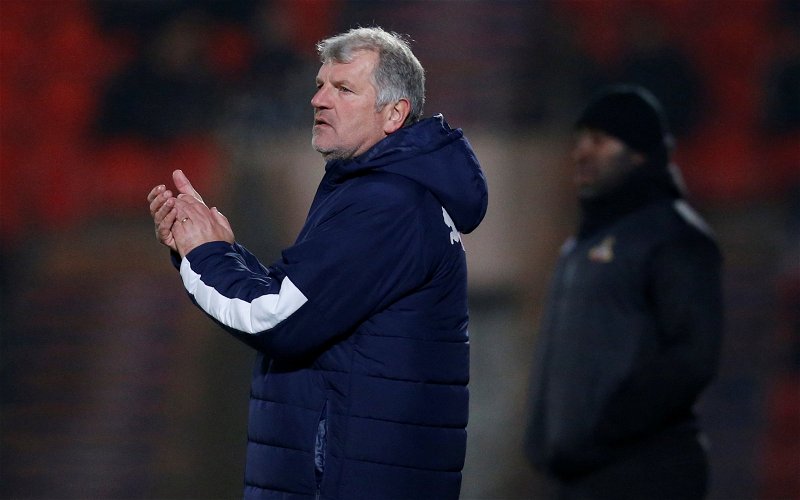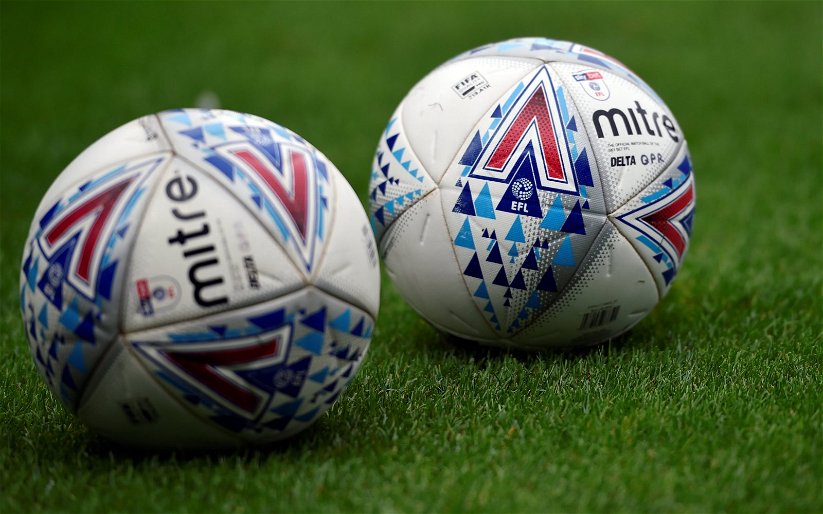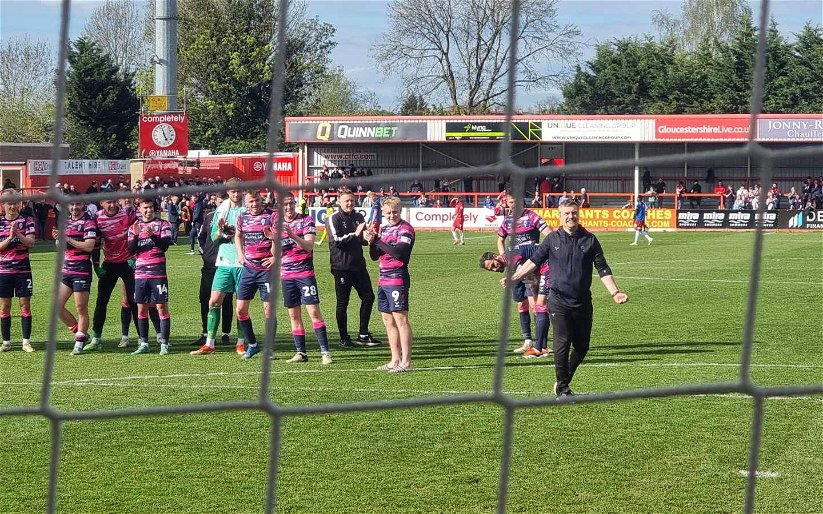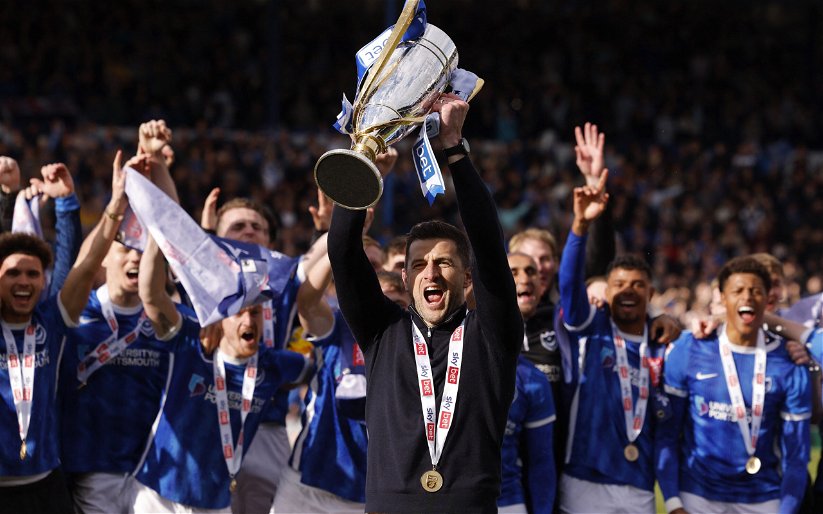As we have seen many times in football, players become associated with one club or with one manager during their career, and often in their career in coaching thereafter. Skilful midfielder Glyn Hodges is one of the few to become associated with two managers, in the significant shape of Dave Bassett and Mark Hughes. Bassett is where everything began for Hodges, or almost. Put your flares and platform soles on, because we need to go all the way back to the Seventies to explain.
Growing up in Norbury, Glyn Hodges started his youth career with local club Mitcham Royals before enjoying short spells with Derby, Fulham, Crystal Palace and Arsenal before spending four years in the youth set-up at Chelsea. In February 1979 he signed as an apprentice for his local club Wimbledon under the managership of Dario Gradi, who had been his youth coach at Chelsea. It was a good time to join: the original Dons had been elected to the Football League at the expense of Workington in 1977 and had just won promotion to the old Third Division. Unfortunately, it ended in immediate relegation back to the Fourth Division for 1980-81, although Hodges did not appear for the first team that season.
Although it could not be known at the time, it was the start of an exhilarating rollercoaster ride that would see Hodges play for his club in all four divisions of the Football League in seven seasons. Hodges made his debut at the age of 17 in the opening stages of the 1980-81 season and became a virtual fixture thereafter. That team already included some significant figures: Dave Beasant, Alan Cork and Mick Smith were also regulars. However, the most important event came in January 1981 with the appointment of a certain Dave Bassett in place of Gradi, who had followed chairman Ron Noades to neighbours Crystal Palace. Wimbledon were down in tenth place, some six points behind the top four, but a scintillating run of ten wins and five draws from sixteen games moved the side into third place behind runaway pair Southend and Lincoln. A 4-1 win over Rochdale in the penultimate game sealed promotion, although the crowd at that key match of just 3,884 did not bode well for the club’s ambitions. What had been established immediately was the legendary style of play: the ball-playing Hodges admits to having been confused by it at the time. It was also Bassett who converted the central midfielder to a winger, and he never looked back.
After three months playing for now-defunct Finnish club Koparit in the summer of 1981, Hodges returned to South London eager to face the challenge of the Third Division. Once again, promotion proved a false dawn. Wimbledon failed to win any of their opening nine games in 1981-82, and were eight points behind safety with five games remaining. Despite a terrific run of four wins and a draw from those games, the Dons were relegated on goal difference and went straight back to the basement for the second time in three seasons. They bounced back immediately, remaining unbeaten in the first eleven games of 1982-83 to top the Fourth Division table. Despite a brief mid-season wobble, a fantastic run of sixteen wins and six draws handed the club the title with a club record 98 points, eight clear of runners-up Hull. Those gates remained a worry, with only 2,717 at the title-winning 5-0 win over Blackpool. That gave Hodges the unusual combination of promotion-relegation-promotion in his first three seasons in football.
It was an important season for Hodges personally, making his Wales U21 debut against Yugoslavia in December as a substitute for Mark Hughes, which also marked the start of the second key connection in his career. It made him the first Wimbledon player ever to be capped at U21 level.
This time, there was to be no return to the bottom tier. Wimbledon got off to a great start in 1983-84, and remained in contention for automatic promotion for the entire season. A last-minute winner from Hodges at Lincoln in April put them second, and a 2-1 win away to promotion rivals Sheffield United with three games remaining left them needing three points from two games. Despite a 3-1 defeat to Gillingham two days later in front of 6,009 at Plough Lane, Wimbledon were promoted due to Sheffield United’s defeat at Bolton. Hodges contributed an incredible 15 goals from midfield, and extended his record to promotion-relegation-promotion-promotion in successive seasons. Then came a bombshell: manager Bassett took the vacant job at Crystal Palace in May. Fortunately, he changed his mind, and returned four days later. It proved a significant decision. The close season marked another milestone for Hodges, with his senior debut for Wales in a 1-0 friendly defeat to Norway in Trondheim on 6 June 1984. The match made him the first player in Wimbledon’s history to win a full international cap, although he was destined to be in and out of the Welsh side thereafter.
The football world awaited Wimbledon’s immediate relegation back to the Third Division in 1984-85, but the side was never in trouble despite the occasional heavy defeat. The twelfth-place finish was their highest ever league placing, but the following season was to blow all of that away. Wimbledon remained just on the fringe of the promotion race for most of the season before another incredible run saw them remain unbeaten in their last sixteen games. A 1-0 win at Huddersfield took Wimbledon into the First Division with two games to spare. Not many players can claim four promotions in their first six seasons as a footballer, but that was Hodges’ record.
Wimbledon lost their first-ever game in England’s top tier by 3-1 at Manchester City on 23 August 1986, and the football world once again awaited their demise. However, Wimbledon beat Aston Villa 3-2 in the next match, giving the club its first-ever top-flight win, and also making Glyn Hodges the first player in the club’s history to score in all four divisions. Incredibly, two more wins took the side to the top of the First Division after just four games, although they were to stay there for just one more game before reality reappeared on the scene. Despite a brief flirtation with the relegation positions in November, Wimbledon shot back up the table. Four successive wins saw them finish the season in sixth place, although there was to be no European adventure. Attendances were often well down into four figures, although there was the occasional high such as the 11,708 who witnessed league leaders Wimbledon lose top spot with a home defeat by Everton, and the season-high of 15,978 against Liverpool. A further 15,636 saw the FA Cup quarter-final defeat to Spurs. Wimbledon had established themselves as one of England’s top teams after just ten years in the Football League.
Another personal landmark was achieved on 1 April 1987: Hodges became the first player in Wimbledon’s history to score an international goal when he scored Wales’ second in the 4-0 European Championship win over Finland at Wrexham.
However, that was to be it for Glyn Hodges and Wimbledon. Manager Dave Bassett moved on to Watford in June 1987 after a dispute with flamboyant chairman Sam Hammam, and tried to take Hodges with him. Hodges was out of contract, and received offers from QPR as well as Watford. However, for some reason, he wanted to leave London and signed for Newcastle for £300,000. In total, he scored an impressive 55 goals in 273 appearances for the Plough Lane club.
Hodges’ Newcastle adventure was destined to last only four months. Playing out of position, he made only seven appearances before joining up with Dave Bassett at Watford in October for £320,000. Unfortunately, that was destined not to last either: Watford were bottom of the First Division, and Hodges made his debut in another defeat, 1-0 at Coventry on 3 October. Results did not pick up, and Bassett was sacked on 12 January 1988. Watford eventually finished second from bottom under new manager Steve Harrison and were relegated with games to spare. Hodges would have done well to stay at Wimbledon, who finished seventh and won the FA Cup; ironically, Watford were one of Wimbledon’s victims, beaten 2-1 in the quarter-final at Vicarage Road.
Watford remained in contention for the play-offs for the whole of the 1988-89 season without looking likely to trouble the top two places. A play-off berth was secured with ease, although the promotion dream ended with a semi-final defeat to Blackburn on away goals. Consolation for Hodges came in the shape of the club’s Player of the Season award. Expectations for 1989-90 were high, and Watford got away to a good start. However, being joint-top after four games was as good as it got, with the side sliding away towards the bottom four. Despite some good results including a 7-2 win over Bradford, Watford finished fifteenth.
It was time for Hodges to move on again, and in June 1990 he signed for First Division Crystal Palace for £410,000 despite receiving an offer from Dave Bassett at Sheffield United. As per his ill-fated move to Newcastle three years earlier, his time at Selhurst was to be similarly short. After just eleven appearances, he signed for Bassett’s Sheffield United on loan in January 1991. United were five points adrift at the foot of the First Division and heading for certain relegation. United lost 2-0 at Manchester City on his debut, but then won their next seven league games to haul themselves up to twelfth and clear of the bottom two. Fans were impressed with Hodges’ contribution, and the move was made permanent in April for £400,000, uniquely paid for by a Grand National sweepstake.
The Blades got off to another dreadful start in 1991-92, sitting bottom of the table after failing to win any of their opening twelve games. A 2-0 win over neighbours Sheffield Wednesday kick-started their season, and a good run through January and February pulled them clear again. A great run of six wins and two draws took the Blades into the top half, and a place in the inaugural FA Premier League for 1992-93. A 2-1 win over Manchester United got the season off to a much better start than in previous years, but old habits returned as United sat in the bottom two a month later. A tense relegation battle ensued, alleviated by a run to the FA Cup semi-final where they went down 2-1 at Wembley to old enemy Sheffield Wednesday. It was Hodges’ first appearance at the stadium. United again defied the odds to stay up by three points, winning their last three games to do so. Hodges had the distinction of scoring the goal on 1 May 1993 that relegated Nottingham Forest in Brian Clough’s final home game at the City Ground.
Amazingly, United got off to yet another poor start in 1993-94 and sat in the bottom three for most of the season. A run of just one defeat in twelve then suggested another great escape, but it was not to be: a 3-2 defeat at Chelsea on the final day, combined with points for Everton and Ipswich, sent the Blades down. It was an agonising defeat: United had led 2-1 at Chelsea with five minutes to play. United made a concerted promotion challenge in 1994-95 before a disastrous run of one win from their last nine games left them eight points short of the play-offs. The 1995-96 season continued in the same vein as United lost their first five games. Bassett resigned on 12 December after a 2-0 defeat to Huddersfield left them second from bottom. Hodges was not to survive much longer at Bramall Lane without Bassett. He made his 18th and final international appearance in a 3-0 friendly defeat to Italy in Terni on 24 January 1996 before signing for Derby on a free transfer three weeks later. He made 171 appearances for Sheffield United, scoring 22 goals.
Derby proved to be another short stay, but his 9 appearances helped the Rams to promotion as First Division runners-up. The rest of his playing career consisted of a number of short stays without much success. The first of two spells playing for Sing Tao in Hong Kong in 1996-97 was followed by a return to English football with fourth tier strugglers Hull in August 1997. His solitary season was not a success, as Hull finished third from bottom of the Football League. With his playing career seemingly over, he linked up again with Dave Bassett as a coach at Nottingham Forest in February 1998. Forest won promotion back to the Premier League as First Division champions a few months later. An injury crisis at the start of the 1998-99 season prompted a surprise return to the Premier League at the age of 35, and Hodges made five appearances before ending his top-flight career at Old Trafford in front of 55,216 on Boxing Day 1998. Bassett was sacked in January 1999 with Forest bottom of the Premier League, and Hodges made one more Football League appearance for Third Division Scarborough before spending one final season coaching and playing a handful of games for TNS in Wales.
Hodges ended his playing career in 2000 with 109 goals from 623 club appearances, plus 2 goals in 18 appearances for Wales. He also holds the distinction of being the only player to have appeared in the top flight for four different clubs under the same manager.
His second coaching role came at Barnsley in the summer 2000, serving as reserve team coach under a certain Dave Bassett. The relationship was again quickly broken when Bassett was sacked on 19 December, although Hodges remained under new manager Nigel Spackman. When Spackman was sacked in October 2001 after a poor start to the season, Hodges was appointed caretaker until a permanent appointment could be found. Although he won just one of his four league games to leave Barnsley in 23rd place, it gave him his first taste of management. Barnsley were relegated to the third tier under new manager Steve Parkin, and the decline continued in 2002-03. Parkin was sacked on 15 October 2002 with Barnsley just four points clear of the relegation zone, and Hodges was again asked to take over as caretaker. The club was in administration by that stage due to the collapse of ITV Digital, and the objective was simply to keep Barnsley in the division. He lost his first game at Tranmere, and points proved very hard to come by with no budget for new players. Safety was only secured with a 1-0 win over Brentford in the penultimate game, but the target had been achieved. A takeover of the club proved the end of the road for Hodges, and he was replaced by Gudjon Thordarson in June 2003.
The next stop was unexpected. Having originally accepted a coaching job in the USA, Hodges needed a visa reference from old friend and current Wales manager Mark Hughes. Hughes offered him a job instead as manager of Wales U21, which Hodges accepted. It was a short-lived appointment, with Hughes leaving for Blackburn in September 2004 after five years in charge of the national side. New manager John Toshack chose to bring in his own staff, and Hodges and fellow coach Neville Southall were surplus to requirements.
There was only one place to go, and Hodges joined Hughes at Premier League Blackburn as reserve team manager. The pair remained at Ewood Park for four seasons until Hughes was appointed manager of ambitious Manchester City in June 2008. Hodges followed in August in his now-familiar role of reserve team manager. Despite being in the top six of the Premier League, Hughes and his staff were sacked in December 2009. Hodges drifted away to Leeds for a short period before linking up with Hughes for the third time, at Fulham from October 2010. This time he was appointed first-team coach for the first time, although it was to be another short stay when Hughes resigned in June 2011. Hodges moved on to Queens Park Rangers in July 2012 as head of coaching and coach education under… Mark Hughes again. And when Hughes was sacked in November 2012, Hodges followed him to his new club Stoke City in June 2013 as U21 coach, the fifth club they had worked for together. This time it was to be a lengthy stay, remaining in their posts until January 2018.
After a spell out of the game, in December 2018 Hodges returned as assistant manager to former team mate Wally Downes at phoenix club AFC Wimbledon. The wheel had turned full circle, returning to his spiritual home some thirty-nine years after signing for the original club. AFCW were second from bottom of League One with only four wins, but the pair kept the side up against the odds. At the beginning of March, the Dons were seven points from safety, but a run of just one defeat from their last twelve games ensured survival with a 0-0 draw at Bradford on the final day. The 2019-20 season started very poorly with just three draws from the first eleven matches. When Downes was suspended and then sacked by the club in October for gambling irregularities, Hodges was the obvious successor. Three wins from his first four games took the side out of the bottom three, and survival was secured by three points when the season was curtailed in March.
Although only appointed to his first permanent managerial position at the age of 56, Hodges has forty years’ experience at all levels of the professional game and holds the UEFA Pro Licence. Whether the likeable club legend is able to make the transition from coach to manager remains to be seen, but it is entirely appropriate that a major figure from the Crazy Gang should be the one to lead the club’s new incarnation back to its home town in October.

Key:
P = Promoted; R = Relegated; SF = Lost in play-off semi-final; F = Lost in play-off final; PO = Won play-off final; D = Demoted.
Figures are league games only; cup matches and play-offs are not included.
League position shown is either the position at the end of the season or the position at the time of departure

Writer: Scotimp
If you haven’t already had a go at our quizzes, this is a great way to learn some random information about the Football Club, as well as helping us generate much-needed page views: Quiz No.1, Quiz No.2, Quiz No.3, Quiz No.4, Quiz No.5, Quiz No.6, Quiz No.7, Quiz No.8, Quiz No.9, Quiz No.10, Quiz No.11, Quiz No.12, Quiz No.13, Quiz No.14, Quiz No.15, Quiz No.16, Quiz No.17, Quiz No.18, Quiz No.19, Quiz No.20, Quiz No.21, Quiz No.22, Quiz No.23, Quiz No.24, Quiz No.25, Quiz No.26, Quiz No.27, Quiz No.28, Quiz No.29 and Quiz No.30.
Who Are The League One Managers?
No.2: Glyn Hodges (@AFCWimbledon):https://t.co/GWo6AEA0Jn#AFCW #BackToPloughLane pic.twitter.com/3jXUwOU5Bv
— Vital Lincoln City (@VitalLincoln) August 19, 2020
https://www.facebook.com/VitalLincolnCity/posts/3196380400398183



